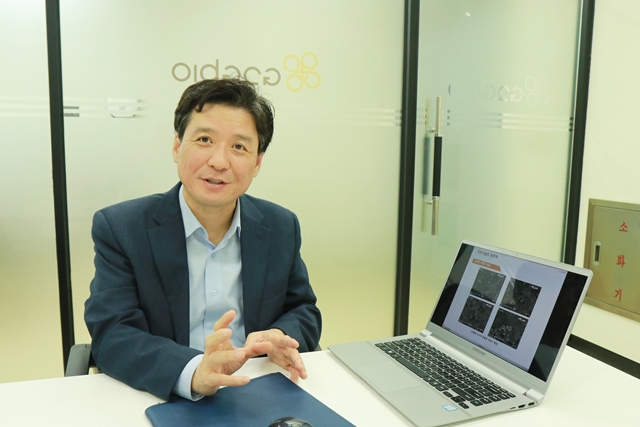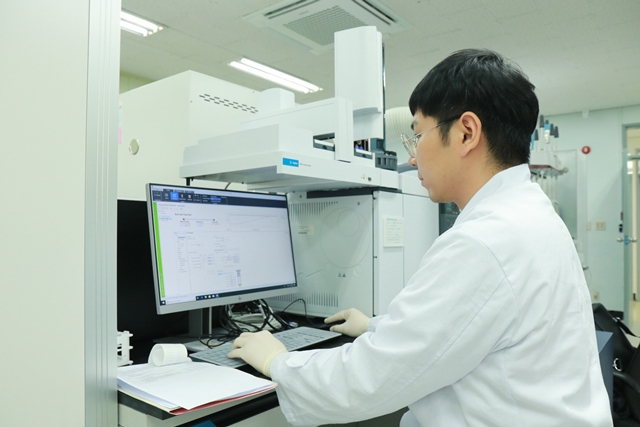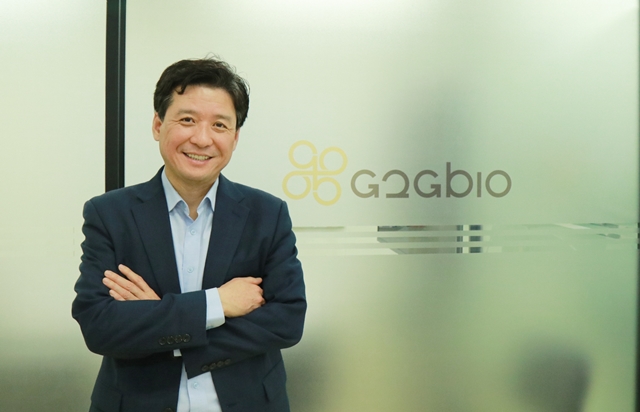[Interview] Lee Heeyong, CEO of G2GBIO
Generally, it takes ten years and one trillion KRW to develop a new medicine. But a new start-up firm has delivered good news in just two years and seven months since its founding. It is G2GBIO, one of the second-generation biotech start-ups in Daedeok. Lee Heeyong, CEO of the firm, was asked to explain the firm's next destination.
◆ One injection a month···An Improvement over existing oral medicines

CEO Lee Heeyong explained, "Drugs already marketed can save a lot of time in terms of discovery of a candidate material, efficacy testing and toxicity testing. Also, a clinical trial process up to phase three can be done on a small scale" and "In contrast with a new medicine that normally takes 10 to 15 years to be developed, our modified drugs have enabled us to reduce the time to about seven years."
G2GBIO simply modified how to administer the medicine. As for drugs currently developed for dementia, their effects tend to diminish in some cases regardless of efficacy because some patients don't take their medicine.
As for oral medicines, they have to be administered in a certain interval, but there are some circumstances where patients cannot take them. Also, it is especially difficult for patients with dementia to remember to take their medicine.
G2GBIO modified a method of administration from an oral drug into an injection with long-lasting efficacy. A therapeutic drug is wrapped up with biodegradable macro-molecules to make a microsphere in a size of 10 to 100 ㎛. Once it is administered, it is dissolved in the body. The time required for dissolution can be selectively adjusted to vary an administration interval from a week up to 6 months, making it relatively easy to use.
In particular, G2GBIO resolved difficulties found in the process of making a microsphere and having it work in the body system. "InnoLAMP" developed by the firm helps to generate uniform particles and remove organic solvents used during the manufacturing process. Furthermore, it tremendously improved the filling process for a microsphere needed to secure an aseptic condition that is critical to the production of injections.
InnoLAMP is convenient compared to the previous microsphere technologies and enables mass-production. Because it can make a uniform microsphere adaptable for a given drug, it is in an advantageous position for commercialization.
The next stage is the scale-up. Mr. Lee said, "An incrementally modified drug using a microsphere has advantages such as exemptions from many items of toxicity testing. On the other hand, it is difficult in scale-up. Based on research subjected to rats, it has to be scaled up to a kilogram unit that could also work on actual human bodies."
He went on to say, "We need GMP facilities that correspond to our technology for production and experiments, not just a general injection factory. Currently, a dedicated facility is being constructed at Osong KBIO (Osong Medical Innovation Foundation) and verification is expected to be carried out after construction is completed at the end of this year."


◆ "Become a great company beyond the United States" based on 20 years of experience
"The name "G2GBIO" reflects the meaning "Good to Globe" with an intention to provide good medicines to patients all over the world. Recently, a "G" has been redefined because it aims at reinventing itself as a great biotech firm beyond simply a good company."
It is not easy to establish a "good company," but becoming a "great company" is, undoubtedly, more difficult. In particular, it requires a lot of expense and time. It is all the more challenging because, in this biotech sector, the first to market usually becomes the winner who takes all.
Experience has enabled G2GBIO to confidently knock on the door of the global market. Mr. Lee has carried on research regarding incrementally modified drugs for 24 years after obtaining a doctoral degree in biological engineering from KAIST. Starting from 2002, he assumed responsibility for pharmaceutical R&D at Petpron, including consultancy for Dongkook Pharmaceutical.
He said, "Such a new attempt was onerous for me since the incrementally modified drug based on a microsphere was a different field from what I used to do at Peptron. After giving it a lot of thought, I decided to start anew under the name G2GBIO."
He added, "I started up business with Eunyoung Seol, the head of the research center, and Sujeong Lee, the managing director, who I used to do research with at Peptron. Since we had over 20 years of experience from R&D, regarding technology transfer to market release, G2GBIO has been able to quickly get on track despite that fact it's a new start-up."

Based on these investments, the firm is poised to conduct a phase-1 overseas clinical trial. Mr. Lee mentioned that "I completed a review of the procedures and regulations needed for the clinical trial through a Pre IND (Pre-investigational New Drug Application) meeting with the US FDA (US Food and Drug Administration)" and "G2GBIO is expected to the first among domestic pharmaceutical firms to enter into a clinical trial with its modified drug for dementia."
Mr. Lee also spares no effort in giving tips and advice to would-be entrepreneurs who prepare to start a business in the biotech sector. He said, "The biotech sector is indeed a difficult area for young entrepreneurs because it requires a lot of experience. Before initiating a business, relentless preparations should be made to be equipped with the necessary experience and know-how."
He also emphasized, "Academic research and research for business are two different things. If anyone is considering a business start-up, he or she should be well prepared for a company operation. It is important to tap into support projects and to receive guidance from national or local governments and also to meet and engage in communications with entrepreneurs who have already started up businesses."
댓글 정렬